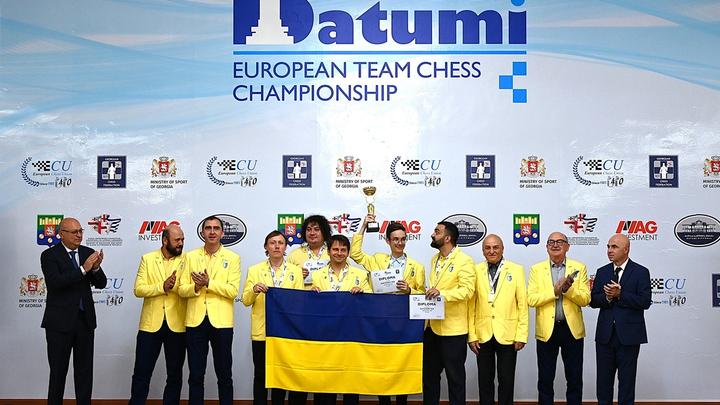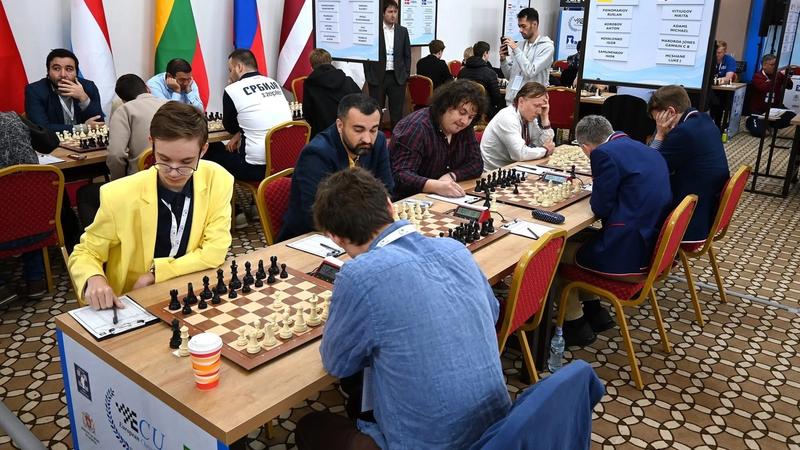Ukraine's Chess Team Wins The Euros. But Greater Struggles Lie Ahead

Homes have been bombed. Chess clubs have been bombed. The whole country torn apart amidst a devastating war with Russia.
A key member of the team, GM Igor Kovalenko, even needed to take leave from his country's armed forces in order to play.
Ukraine entered the European Team Chess Championships in Batumi, Georgia, with its usual strong team seeded ninth. While by no means the underdog, winning the event still seemed a tall order.
How do you go from fighting on the frontline to playing in an elite chess tournament?
Yet, somehow, after nine rounds of intense competition, the war-torn country's Open team triumphed to win gold. Its impressive Women's team also finished second.

In the final round of the Open on Tuesday, Azerbaijan crumbled against Serbia, losing 3-1 and leaving Ukraine only needing a draw against England to clinch the title.
The vital match ended 2.5-1.5 to Ukraine with GM Ihor Samunenkov scoring the decisive win over GM Luke McShane.
And Kovalenko? He finished with a score of 6.5/8 and a 2800 tournament performance rating winning the overall best performance medal for board 4.
Ukraine's Open team are champions of Europe.
But like everything involving Ukraine in chess right now, it was a win secured amid a tense and politically-charged backdrop.
Off the board, Ukraine's players and the Ukrainian Chess Federation are fighting another battle over the participation of Russian teams in international competition, which is still a hot issue.
A Fine Line
The mighty Russia, that traditional powerhouse of European chess, again wasn't represented at the Euros.
The Chess Federation of Russia (CFR) is now no longer a member of the European Chess Federation—it left in 2023 to join the Asian Chess Federation (ACF) so doesn't qualify.
In any case, Russian and Belarusian teams teams remain, for now, banned from events like this. Following the full-scale invasion that started in February 2022, the international chess federation FIDE was quick to follow International Olympic Committee (IOC) guidelines and exclude them.
But Russia wants back in, a proposal Ukraine vehemently opposes, and the two camps look ready to lock horns again.
A potential flare-up could come as soon as next month at the 2025 Women's World Team Championship in Linares, Spain. FIDE has approved the participation of a Russian team in the event, leading to protests from the Ukrainian Chess Federation (UCF).
What happens in Linares remains to be seen but could set the tone going forward. If a Russian team does compete, will Ukraine's silver medal winning Women's team refuse to participate? Or will Ukraine play anyway?
That is just the start. Come December a bigger battle is looming. FIDE has confirmed it is preparing to discuss the possible reinstatement of Russian and Belarusian national teams in official competitions at its General Assembly.
This is deeply controversial in the West and the UCF is sure to oppose it. The UCF have already headed off one motion to remove restrictions on the Russian and Belarusian federations tabled by the Kyrgyz Chess Federation at the 2024 General Assembly in Budapest.
FIDE's stated mission is to be a-political. Yet it has to tread a fine line here if it wants to stay on-side with the IOC. If FIDE is seen to be transgressing IOC policy chess could potentially lose its status as an Olympic sport, leading to serious consequences for some national federations. Much government funding for chess around the world depends on that status.
Earlier this month, FIDE President Arkady Dvorkovich told Russian state news agency TASS that the issue will be formally included as an agenda item for delegates to discuss.
"We're closely monitoring developments within the International Olympic Committee, other sports federations, and the Paralympic Committee, which recently permitted the return of the Russian Paralympic Committee," he explained. "We can't ignore the stance of international bodies, as our own member federations are tied to their respective National Olympic Committees."
FIDE faces the daunting task of trying to preserve unity without abandoning principles of neutrality and international solidarity.
All this means that come December, Ukraine's team will no doubt be going into battle again, but fighting chess politics, not over the board.


